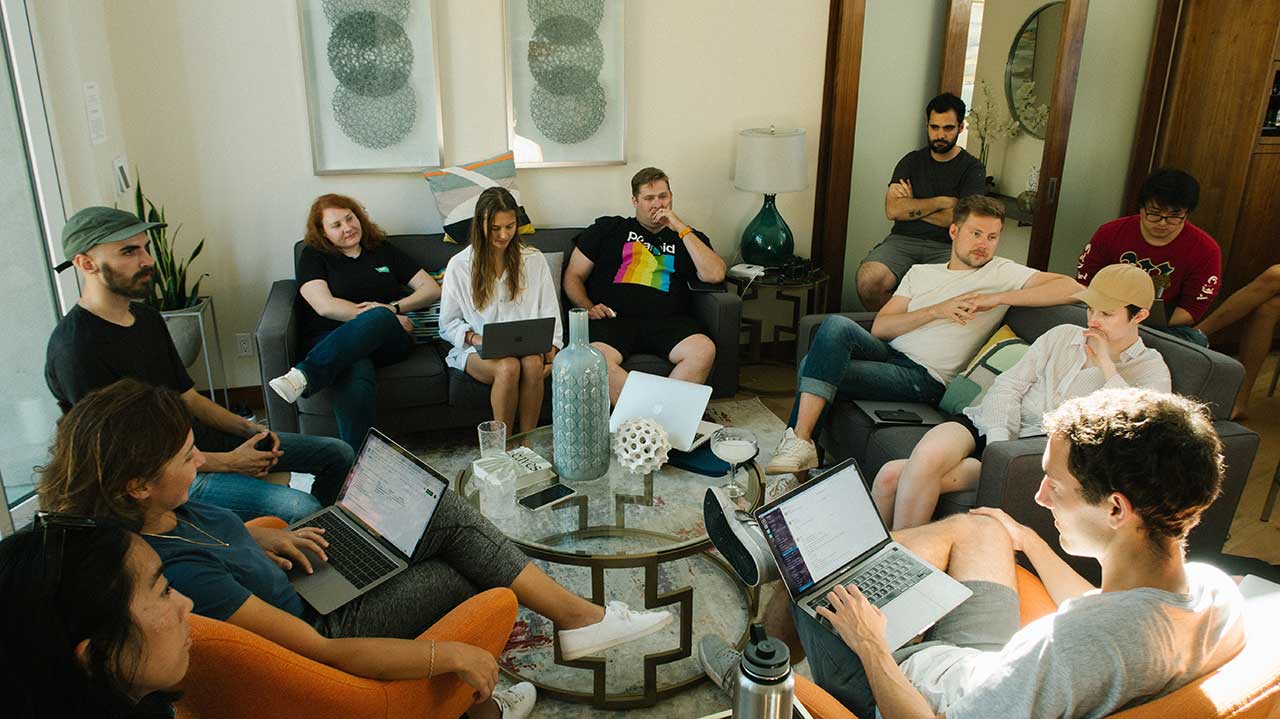If you were being entirely honest, what would you guess your success rate is for all the goals you set yourself?
For most adults with ADHD, I suspect the answer is lower than we’d like. Just think about all those New Year’s resolutions, and how frequently they’re abandoned as life gets in the way.
Deciding on a goal involves little effort, and giving it up is just as easy. The hard part is achieving it.
We need stronger incentives, a system that will hold us accountable if we fail to follow through. And one of the most time-tested and effective means of doing this is involving other people that also share unique creative traits of ADHD.
We are social creatures and we’ve used groups of cooperating individuals to achieve goals for as long as we’ve been human. If you find yourself struggling to stick to your goals, peer accountability and group coaching may be your answer.
Peer Accountability For ADHD
Peer accountability comes in many varieties, but at a minimum it should always involve disclosing your goal to someone else and regular updates on your progress.
Research suggests people are 65% likely to meet their goals if they simply commit to another person, while that rate skyrockets to 95% if there are regular meetings and progress reports.
Beyond that, you will need to decide how many people are going to be involved and what type of dynamic the group will have.
You might have a one-on-one mentorship, a one-on-one accountability buddy, a small group of people working on disparate goals, or a group working towards the same goal.
The important thing is you create a group where you are surrounded by other likeminded ADHD adults who understand the struggles of ADHD and can give you advice and support that is tailored to the ADHD brain.
One-On-One Accountability Partners
There are fewer complications to working with one person, it’s easier to find mutually free time and to get their undivided attention during meetings and checkups.
Your accountability partner might be a mentor that already has experience with the goal or subject you’re investing in, and so can offer constructive advice and feedback, correct mistakes, and help you improve more effectively.
They could be someone at a similar level to you, and that’s after the same goal. This means you would also be there to help them, you can share progress reports together and even engage in friendly competition.
Then again, you might look for someone who isn’t going to mentor you or strive towards the same goal, but that you commit to and who will check in regularly to make sure you’re not slacking off. This could be a friend or relative, provided they’re going to be reliable and not offer you an easy way out.
Group Coaching And Mastermind Groups of 3+
Sometimes peer accountability can benefit from a group of people. Together they perform more effectively, see things from different perspectives, and push each other further.
A popular group form of peer accountability is group coaching through a Mastermind Group. These groups don’t just hold you accountable but become a core part of the process itself.
Typically around 5 or 6 members gather regularly and engage in aspects from goal-setting, planning, brainstorming, problem-solving, advice, and feedback.
Sometimes groups have facilitators that help run constructive conversations and ensure they stay on course. The facilitator is not the person with all the answers that everyone else depends on, but rather someone that ensures the members are working together effectively.
Mastermind groups aren’t the only way to get people to work together. You might choose to have a few people that just regularly check up on each other’s progress rather than involve themselves in all aspects.
Whichever option you decide on, it’s safe to say you’ll get more done when you get others involved.
How Peer Accountability Works
While peer accountability should of course make you less likely to give up on your goal, that’s far from the only benefit you’ll experience. From increased productivity, reduced procrastination, and greater creativity, there are many ways peer accountability helps.
New Perspectives
Rather than just giving you a push to keep going, other people bring their own sets of ideas, advice, tools, and skills that can help when you get stuck.
They improve your problem-solving capacity and boost creativity with their ability to see problems from different angles and think in different ways.
Because of this, they make goal achievement more efficient and interesting. Obstacles are less daunting and overcoming them is a more enjoyable experience.
Constant Improvement
A byproduct of working with people that have their own ideas and methods is that you’re likely to learn from them. You’ll pick up some of their perspectives so that in future cases, even when they’re no longer around, you can still draw on them.
Great accountability partners will have your betterment in mind. They’ll be on the lookout for weaknesses that you can improve on and other growth opportunities that you wouldn’t identify on your own
It Keeps You Honest
It’s much easier to lie to yourself, or to put something off until tomorrow, when you’re the only one who will know about it.
We’re too susceptible to our own excuses, but others aren’t so easily fooled, and they should be willing to tell us so.
This depends on them being honest, so it’s essential to pick people that aren’t going to just agree with you or give you an easy out, but those that can respectfully disagree and speak their mind.
Extra Incentives
There’s something nice about having other people there to share in your success and celebrate with you. You feel a sense of belonging.
But more than that, you can add to the incentive structure by committing to pay for failures or different rewards for success. You might agree to donate money to a charity if you fail, or share in beers and a pizza with your peers when you succeed.
There are many options, but do be careful with options that would benefit your peers if you fail—you want them invested in your success after all!
A Rise In Motivation
Peer pressure can be a good thing: it keeps you engaged, making it harder to let your commitments slide. It turns out people can motivate us even while we work alone.
One study found that when participants thought others were working on the same project as they were, they persisted on that task between 48 and 64 percent longer—even though they were working by themselves.
“The results showed that simply feeling like you’re part of a team of people working on a task makes people more motivated as they take on challenges,” said Gregory Walton.
What You Need To Thrive With ADHD
If you want to experience all the benefits that peer accountability has to offer, it’s not enough to just form a group and start working on any goal. There are some important features and recommendations that will get the most out of it.
Good People
The most essential part of peer accountability is finding the right peers.
They need to be people you can trust to be honest with you, and that you are comfortable being honest with. They’ll need to be disciplined and committed to your goal, prepared to meet regularly and offer support when it’s needed.
Commitment is all the more important if it’s a one-on-one setup because you’re suddenly on your own if they don’t show up, whereas in a group setting you’ll have others to fall back on.
On the other hand, a group that’s too large makes it easy to hide in the background, so you want people who are not afraid to call you out and encourage your participation.
While family and friends are the easiest to ask, try to avoid those that will go easy on you, preferring you be happy rather than pushing you outside your comfort zone. It’s beset to team up with other adults with ADHD so they understand you better.
Clear Goals
It’s important to know precisely what you’re aiming for. A good way to do this is to set SMART goals:
Specific—you should be as precise and clear as possible about what you want to achieve.
Measurable—consider checkpoints on the way to indicate how well you’re progressing.
Attainable—don’t pick goals so lofty you’re unlikely to achieve them.
Relevant—pick goals that align with your values and long-term plans.
Time-bound—set a realistic deadline for when this goal must be achieved.
The better goals you set, the easier it will be to stay motivated and for your peers to keep track of your progress and offer constructive feedback. SMART goals ensure they’re not too vague or unattainable.
Regular Checkups
For peer accountability and group coaching to work effectively you need to stay in contact to update your progress and get feedback. There are a number of ways to do this.
It’s a good idea to meet regularly in real-time, whether in person or online. It might be a short call for a quick progress report, or a longer 60 to 90-minute call with greater feedback and discussion.
You might even try working together for a few hours so you can interact during the process. This should increase your motivation and engagement, while teamwork can also enhance problem-solving and creativity.
Beyond the real-time calls, you can send messages about progress, achievements, and struggles between work sessions or at the end of the day.
While you don’t want to overdo the communication, you do want to stay in touch often enough that you feel some pressure to achieve something in between checkups.
Constructive Criticism
Feedback isn’t always pleasant, you need to be able to take criticism the right way. It might be a little dent to your ego but that’s often the price of growth.
Make sure you don’t dismiss feedback that you don’t like, but feel free to discuss it further. Remember that they’re trying to support you more than they’re judging mistakes.
“It’s about support, support, love and support,” says Tony Horton, creator of the P90X home workouts, “with some tough love along the way.”
But don’t forget that this isn’t just about your goals but also those of your peers, whether you’re all working towards the same goal or distinct goals. That means you’ll need to be observant and ready to offer your advice and feedback to others.
Being honest about your and others’ performance can feel uncomfortable, but it’s an essential part of making progress and improvements. Over time it will get easier.
Find Your ADHD Peers
Peer accountability and group coaching is a powerful addition to any effective goal-setting system. Having people to keep you accountable helps you stay on track and motivated.
It can also enhance problem-solving and creativity while encouraging learning and development. And let’s face it, getting others involved is usually a more enjoyable experience than working in isolation.
Teamwork and group goal-setting aren’t new, but over time we’ve developed better ways to manage the dynamics and get more from working together. It’s something you should seriously consider adding to your life, whether or not you struggle with goals.
- 10 Tips, Tricks And Tools To Overcome ADHD Paralysis - March 19, 2025
- 10 Interesting Facts About Adult ADHD And Mental Health - March 18, 2025
- 15 Ways To Manage ADHD Without Meds By Biohacking Dopamine - February 14, 2025




